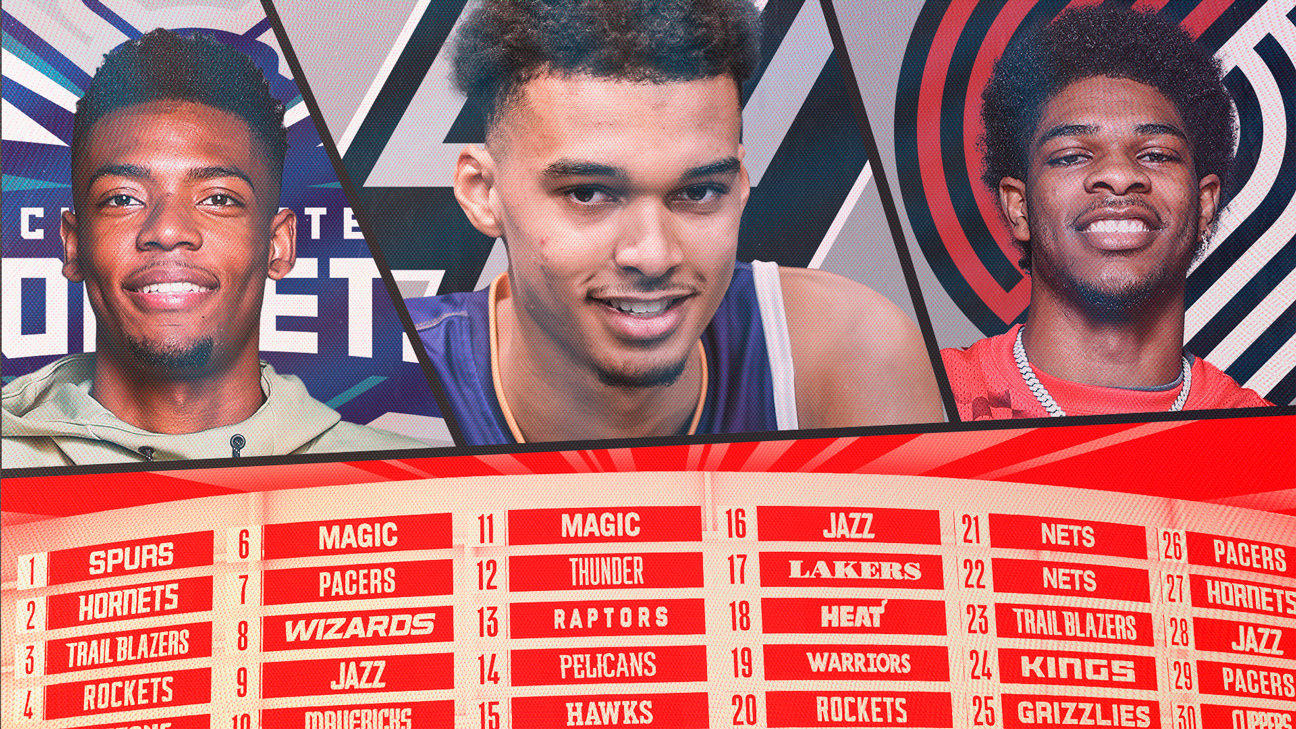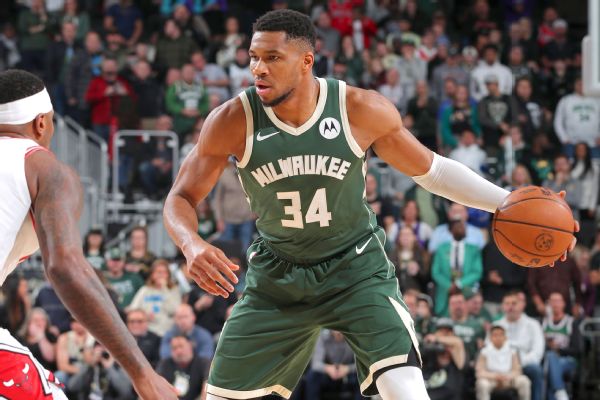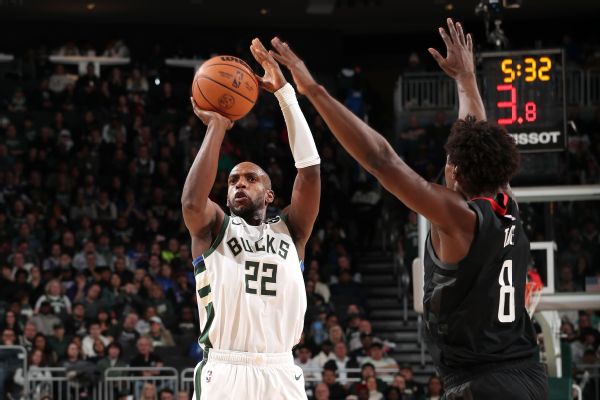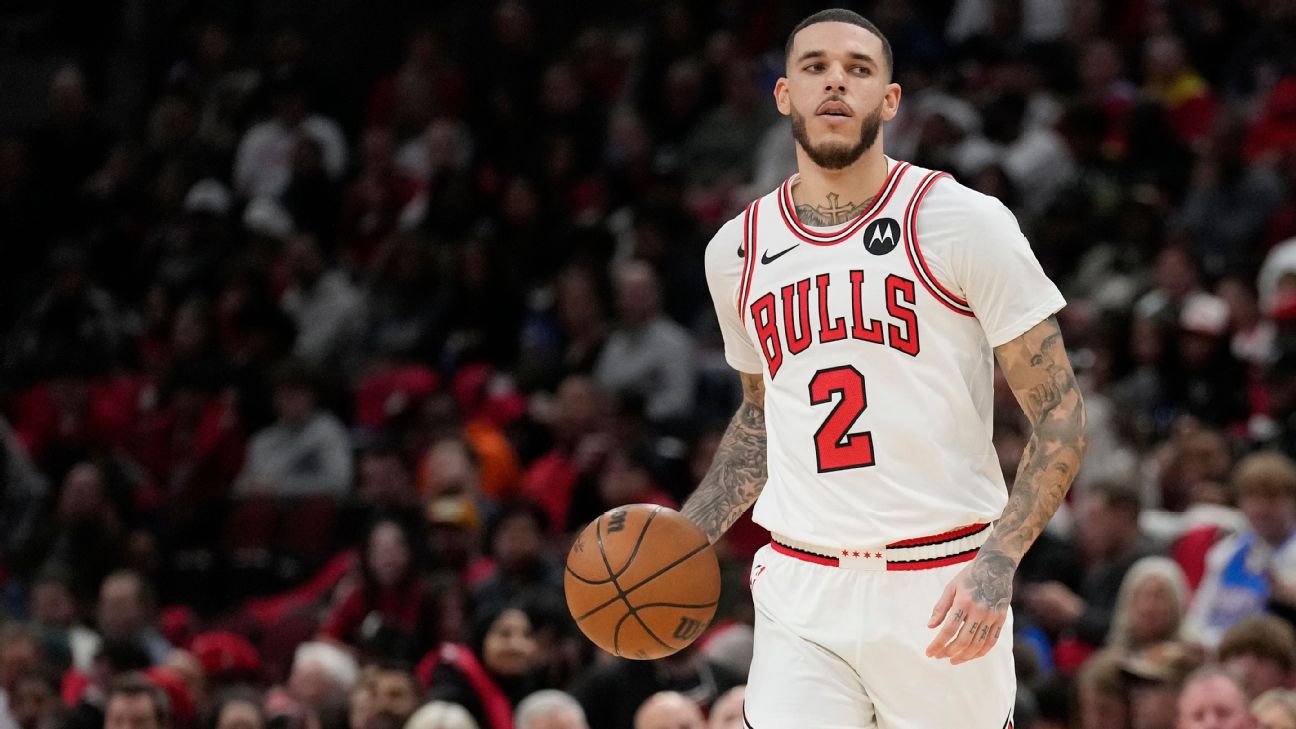Illustration by ESPN
Which teams won and lost the 2023 NBA draft? We won’t really know that answer, of course, until years down the road when we see how players develop and which ones live up to expectations, fall short or exceed them.
That said, teams don’t get to draft with a crystal ball, which makes grading their process of selecting players a fairer measure in many ways than after-the-fact history that’s subject to hindsight.
With that in mind, let’s grade how all 30 teams did in Thursday’s draft, which was marked by a lack of major trades in the first round before a flurry of them in the second round. Generally speaking, my grades for teams are based on how well they maximized the picks they entered the draft with rather than simply how much talent they accumulated, given that’s more a product of last season’s record (or past trades) than decision-making in the draft.
I’m also grading on a curve with an average distribution of a “B,” making an “A” grade something a team truly has to earn. Let’s get to the grades.
Jump to a team:
ATL | BOS | BKN | CHA | CHI | CLE
DAL | DEN | DET | GS | HOU | IND
LAC | LAL | MEM | MIA | MIL | MIN
NO | NY | OKC | ORL | PHI | PHX
POR | SAC | SA | TOR | UTAH | WAS
: B
Round 1: Kobe Bufkin (No. 15)
Round 2: Mouhamed Gueye (No. 39), Seth Lundy (No. 46)
The Hawks’ deep rotation gave them the luxury of taking the best player available with the first pick outside the lottery. Bufkin, expected to go a few picks higher, fit the bill. How he fits in a backcourt with Dejounte Murray and Trae Young is unclear, but by the time Bufkin is ready to step into a larger role, Atlanta’s guard rotation might look totally different.
Lundy is a shooter with size, an archetype teams can never have enough of, while the Hawks added another second-round pick via trade to take Gueye.
: B+
Round 1: None
Round 2: Jordan Walsh (No. 38)
A flow chart is necessary to trace the Celtics’ series of four trades down from the 25th pick, acquired from the Grizzlies in Wednesday’s three-team trade that landed Kristaps Porzingis in Boston, to ultimately taking Walsh 38th and adding future second-rounders from three different teams (Atlanta, Detroit and Sacramento).
Those picks could help the Celtics as sweeteners in future trades, while I like the value for Walsh, who ranked 22nd in my stats-based projections.
: B+
Round 1: Noah Clowney (No. 21), Dariq Whitehead (No. 22)
Round 2: Jalen Wilson (No. 51)
With back-to-back picks late in the first round, the Nets took two of the draft’s youngest players. (Whitehead, who turns 19 in August, was the youngest drafted in the first round; Clowney was third.) Whitehead went a little earlier than expected but still well after my projections would have had him (11th) on the strength of his age and EYBL play. Clowney is a good fit for a team lacking size up front, while Wilson has the skills to stick as a role player on the wing.
: B+
Round 1: Brandon Miller (No. 2), Nick Smith Jr. (No. 27)
Round 2: James Nnaji (No. 31), Amari Bailey (No. 41)
The Hornets getting Smith with the 27th pick was one of my favorite selections. In October, Smith was in the top five of the preseason mock draft by ESPN’s Jonathan Givony. As underwhelming as Smith’s season at Arkansas was, that seems like an overcorrection. Charlotte was also appropriately aggressive in moving up to draft Nnaji after he fell to the second round.
Ultimately, our opinions of Charlotte’s draft will rest on the decision to take Miller over Scoot Henderson at No. 2. I’m good with considering Miller the better prospect independent of fit with LaMelo Ball, which shouldn’t be the primary consideration so early in the draft.
: B
Round 1: None
Round 2: Julian Phillips (No. 35)
Having started the night with no picks due to the final piece of the Nikola Vucevic trade (No. 11 to Orlando) and the tampering penalty related to the Lonzo Ball sign-and-trade, the Bulls traded in to take Phillips in a reasonable spot for a talented player who wasn’t particularly productive at Tennessee. Sadly, the biggest news of the night was Bulls vice president Arturas Karnisovas telling reporters Chicago doesn’t expect Ball to play in 2023-24 after undergoing a cartilage transplant.
: B
Round 1: None
Round 2: Emoni Bates (No. 49)
The back half of the second round was an appropriate time to take a swing on Bates, who was unable to translate prep hype into efficiency in two years of college ball at Memphis and Eastern Michigan. I’m skeptical of Bates’ chances to develop into an NBA regular, but that’s not the expectation for the 49th pick.
: B
Round 1: Dereck Lively II (No. 12), Olivier-Maxence Prosper (No. 24)
Round 2: None
I liked Dallas’ pair of interlocking trades that picked up two first-round selections and center Richaun Holmes, while also moving to trade the 10th pick and Davis Bertans to Oklahoma City. As for the picks themselves, Lively seems like strong value and fit. I’m less of a believer in Prosper, who generated few assists or blocks at the NCAA level and ranked 60th in my projections.
: B
Round 1: Julian Strawther (No. 29)
Round 2: Jalen Pickett (No. 32), Hunter Tyson (No. 37)
After a series of pre-draft deals, the defending champs took three college veterans they hope can provide depth to an increasingly expensive roster. Strawther fits the mold of rangy wing players the Nuggets have favored in order to play through screens defensively. He’s also a 38% 3-point shooter, though Strawther might need to add strength to compete with NBA wings.
Denver general manager Calvin Booth has never been afraid to challenge consensus — all three picks went higher than expected, particularly Pickett, who is 23. He might not be able to rely as much on strength against NBA foes, though he brings excellent basketball awareness. Tyson impressed with his shooting and energy at the NBA draft combine.
: B
Round 1: Ausar Thompson (No. 5), Marcus Sasser (No. 25)
Round 2: None
Given what we now know about Cam Whitmore’s slide in the draft, Thompson was the most reasonable pick at No. 5 for a team already overflowing with post players. Like many of Detroit’s wings, Thompson must improve his shooting, but the other tools are there. The Pistons added a more polished prospect by trading back into the first round for Sasser, who could compete with Thompson and Killian Hayes for perimeter minutes next season.
: A-
Round 1: Brandin Podziemski (No. 19)
Round 2: Trayce Jackson-Davis (No. 57)
I found the talk about the Warriors adding older prospects a bit overhyped. Podziemski, 20, is actually younger than Miller and the Thompson twins. The difference between him and past Golden State picks is that Podziemski rates higher in terms of overall basketball ability than physical potential. We’ll see whether that limits Podziemski in the pros, but I’m betting on someone who ranked in the top 10 of my projections.
Jackson-Davis, who will be on a full NBA contract, according to new Warriors GM Mike Dunleavy Jr. (a move that will save Golden State in terms of luxury-tax payments), does fit the older mold at 23. By the 57th pick, however, Jackson-Davis was arguably the best player available.
: A
Round 1: Amen Thompson (No. 4), Cam Whitmore (No. 20)
Round 2: None
Whitmore’s slide was perhaps the biggest story of the draft as it unfolded. A month ago, the Rockets taking Whitmore would have been assumed to be the No. 4 pick. Instead, they were able to take a high-upside swing on Thompson and still get Whitmore with their second pick late in the first round.
Only time will tell whether the medical concerns that played into Whitmore’s fall are legitimate. My assessment is that teams tend to overvalue the long-term downside of injury risk as compared to the risk of drafting someone who can’t contribute when healthy. At the point he was taken, Whitmore — third overall in my projections, which don’t include the Thompsons — was easily worth the gamble.
: B+
Round 1: Jarace Walker (No. 8), Ben Sheppard (No. 26)
Round 2: Mojave King (No. 47), Isaiah Wong (No. 55)
I liked how the Pacers handled the seventh pick, trading back one spot with the Wizards to pick up a couple of future second-rounders while still getting Walker. The fit of Walker and Myles Turner in the Indiana frontcourt looks strong, and adding a power forward fills the Pacers’ biggest need.
Sheppard’s shooting and size makes sense in the Indiana wing rotation alongside 2022 draft picks Bennedict Mathurin and Andrew Nembhard. The Pacers continued adding to their perimeter group in the second round with King and Wong.
: D
Round 1: Kobe Brown (No. 30)
Round 2: Jordan Miller (No. 48)
Among players with projections, Brown had the second lowest of all the players drafted Thursday. Both Brown’s age (23, the oldest player taken in the first round) and his late development into a college star after scoring in single figures in his first two years at Missouri work against his projection. Miller, also 23, gave the Clippers two of the four oldest players taken. That doesn’t rule out successful NBA careers, but it makes them less likely.
: C
Round 1: Jalen Hood-Schifino (No. 17)
Round 2: Maxwell Lewis (No. 40)
Although Hood-Schifino went later than expected, I’m still not a fan of the value for the Lakers. Hood-Schifino ranked outside the top 30 of my projections, and his best skill (contested shot-making) isn’t a fit alongside Anthony Davis and LeBron James, granted that he might ultimately outlast them on the L.A. roster. With the 40th pick, acquired in exchange for cash earlier in the day, the Lakers took a stronger gamble on Lewis, the local Pepperdine player. It wouldn’t have been surprising had Lewis gone late in the first round.
: B-
Round 1: None
Round 2: Gregory Jackson II (No. 45), Tarik Biberovic (No. 56)
By the middle of the second round, the Grizzlies were wise to take a chance on Jackson translating his strong combination of skill and size into better results than we saw at South Carolina. Later, Memphis was the only team to take a stash pick. Biberovic, who played off the bench for EuroLeague power Fenerbahce at age 22, doesn’t seem likely to develop into an NBA contributor.
: B+
Round 1: Jaime Jaquez Jr. (No. 18)
Round 2: None
There’s no better marriage of player and team in this year’s draft than the hard-nosed Jaquez going to the Heat, who surely prized his physical defense. Miami has had good results developing young players as shooters, which will be necessary to maximize Jaquez’s value after he shot just 33% on 3s in his career at UCLA.
: B
Round 1: None
Round 2: Andre Jackson Jr. (No. 36), Chris Livingston (No. 58)
Jackson, the emotional leader of UConn’s national championship squad, was one of my favorite players in this year’s draft. I don’t love the fit of a questionable shooter (29% career on 3s) on a team that needs to give Giannis Antetokounmpo as much space as possible to operate, but I won’t bet against Jackson. With the final pick of the draft, the Bucks took a dart throw on Livingston, who averaged just 6.3 PPG in his lone season at Kentucky.
: B+
Round 1: None
Round 2: Leonard Miller (No. 33), Jaylen Clark (No. 53)
Starting the night with only the 53rd pick after the Rudy Gobert trade, the Timberwolves somehow came away with two of the top 30 players in my projections. Clark being available at No. 53 was unsurprising given questions about his shooting (30% career on 3s), but Minnesota needed to package future picks to move into the early second round to select Miller. Like Clark, Miller must improve his shooting at the NBA level.
: B
Round 1: Jordan Hawkins (No. 14)
Round 2: None
Credit to Trey Murphy III, who said on our Hoop Collective draft livestream that the Pelicans should add shooting with their lone pick at the end of the lottery. They don’t come much better as shooters than Hawkins, who hit 39% of his 3s and 89% of his free throws for the national champion Huskies.
: N/A
Round 1: None
Round 2: None
Like the Bulls, the Knicks started the night with no picks thanks to the deadline trade for Josh Hart. Unlike Chicago, New York finished the night the same way. Knicks fans can console themselves with memories of the role Hart played in their run to the second round of the playoffs.
: B+
Round 1: Cason Wallace (No. 10)
Round 2: Keyontae Johnson (No. 50)
I liked Wallace as a top-10 prospect on the strength of his on-ball defense and ability to generate steals. The Thunder agreed, moving up two spots by taking on Davis Bertans’ contract in order to assure they got their guy. It will be interesting to see how Wallace fits into a backcourt that already includes recent lottery picks Josh Giddey and Jalen Williams plus Lu Dort, but Thunder coach Mark Daigneault isn’t afraid to play multiple guards together.
Remarkably, second-round pick Johnson is older (23) than eight of his new Oklahoma City teammates, including 2020 first-round pick Aleksej Pokusevski.
: B-
Round 1: Anthony Black (No. 6), Jett Howard (No. 11)
Round 2: None
Black very much fits the mold of the Orlando front office, which loves rangy players, sometimes independent of their shooting ability. The 6-foot-7 Black brings great size to the Magic’s backcourt, which has plenty of options (including veteran Markelle Fultz and recent first-round picks Cole Anthony and Jalen Suggs) but no clear anchor.
Howard going ahead of Michigan teammate Bufkin was one of the night’s biggest surprises. Given where Howard was projected (20th in ESPN’s final mock draft), drafting him without moving back seems like a failure to maximize value.
: N/A
Round 1: None
Round 2: None
The Sixers were the other team docked a second-round pick because of a tampering violation (in their case, it was for P.J. Tucker last summer), leaving us with just 58 picks instead of the usual 60. Philadelphia previously traded this year’s first-rounder as part of the deal for James Harden, making this a quiet night for the 76ers’ front office.
: B-
Round 1: None
Round 2: Toumani Camara (No. 52)
After trading for Kevin Durant and Bradley Beal, the Suns won’t be making many draft picks for the foreseeable future. They did manage to hang on to this year’s No. 52 pick, though Camara seems unlikely to contribute for Phoenix this coming season. He’s a strong rebounder for his size, but his 36% 3-point shooting seems unlikely to translate given Camara’s inaccuracy at the foul line (67%).
: A-
Round 1: Scoot Henderson (No. 3), Kris Murray (No. 23)
Round 2: Rayan Rupert (No. 43)
Having moved up to No. 3 via the lottery, the Blazers were in the enviable position of taking whichever of the top three prospects fell to them. Henderson seems to have unusually high upside for a No. 3 pick, even if he’s not likely to become a star on Damian Lillard’s timetable. If Portland is to thread the needle on improving this season while keeping an eye on the future, it might be thanks to the polished Murray, who has the chance to be an immediate rotation contributor.
In the second round, the Blazers scooped up Rupert, easily the highest-ranked remaining player in ESPN’s top 100 at that point (No. 20 overall).
: A-
Round 1: None
Round 2: Colby Jones (No. 34), Jalen Slawson (No. 54)
The big story of the night in California’s capital was Sacramento trading away the No. 24 pick in order to move the salary of center Richaun Holmes and open up significant salary cap space. The Kings still added two of the top 30 prospects in my projections in the second round, trading up to get Jones after the well-rounded Xavier guard slid, and then taking Furman standout Slawson late in the round. Under GM Monte McNair, Sacramento’s picks have tended to match up well with my projections.
: A
Round 1: Victor Wembanyama (No. 1)
Round 2: Sidy Cissoko (No. 44)
As much as I want to grade on process rather than results, it’s impossible to give the Spurs anything but an A for walking away with far and away the best prospect in Wembanyama. Thursday, like the NBA draft lottery, was a transformational night for San Antonio as a franchise. In the second round, the Spurs took a second French prospect in Cissoko, who was productive for G League Ignite last season and a reasonable value in this spot.
: A-
Round 1: Gradey Dick (No. 13)
Round 2: None
Although my grade for Dick’s sequin jacket and turtleneck combo is much lower, the red look proved appropriate after he ended up with Toronto. The Raptors have badly needed shooting to complement their versatile frontcourt players, and Dick fits the bill after shooting 40% from 3-point range in his lone season at Kansas. The interesting question is whether adding Dick makes it easier for Toronto to trade Gary Trent Jr., who exercised his 2023-24 player option earlier this week.
: A-
Round 1: Taylor Hendricks (No. 9), Keyonte George (No. 16), Brice Sensabaugh (No. 28)
Round 2: None
A year into retooling their roster following the Rudy Gobert and Donovan Mitchell trades, the Jazz are still in talent-accumulation mode. Thursday provided plenty of it with three first-round picks. I particularly like the fit of Hendricks’ shooting and size in coach Will Hardy’s system, which maximized those skills from Lauri Markkanen and Kelly Olynyk last year.
At No. 28, I think Sensabaugh was one of the draft’s better values. Yes, he must broaden his contributions outside of scoring, but his combination of volume and efficiency as a freshman at Ohio State was impressive. In between, Utah took a shot at restoring George’s value after a freshman season at Baylor that fell short of expectations.
: C+
Round 1: Bilal Coulibaly (No. 7)
Round 2: Tristan Vukcevic (No. 42)
Say this for Washington’s new front office, led by team president Michael Winger: It’s not operating with any fear.
After making three big trades in a week, the Wizards took an even bigger gamble by moving up a spot to take the late-rising Coulibaly. By contrast to Washington’s relatively safe picks of the recent past, which have yielded solid rotation players but little star potential, drafting Coulibaly — he turns 19 next month — offers far greater upside and downside.
The Wizards did well in the second round to nab Vukcevic, who impressed with his shooting at the NBA draft combine.



